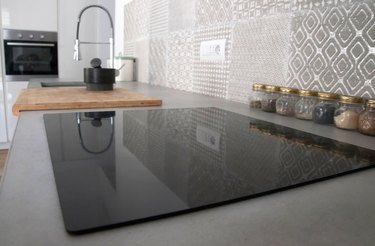
Induction cooktops are a form of kitchen technology that allows a cook to prepare foods without the use of a standard electric hot coil or an open gas flame. Induction cooktops work by using a magnetic coil beneath a glass surface to transfer magnetic energy to iron atoms in the cookware, vibrating them to cause friction. This heats the pots and pans almost instantly.
Induction cooking has its share of advantages, including easy cleanup, precise temperature control and energy efficiency. As a trade-off, however, there are some notable induction cooktop problems.
Video of the Day
Video of the Day
Limited Cookware Options
One of the major problems with using an induction cooktop is the cookware that is necessary. With other types of ranges you pretty much have your choice when it comes to selecting your cookware, but in the case of induction, some of them just may not work at all. The presence of iron to react with the magnetic function of the induction cooktop is necessary to create the heat needed to cook food.
There are plenty of options when it comes to buying induction-friendly cookware, but it could be a problem if you already have cookware and have invested in copper, ceramic, aluminum or glass products. None of these is suitable for induction cooking. You'll need to buy cast iron or stainless steel cookware if you want to make this switch, according to The Induction Site.
Expense of Induction Appliances
With all of its advantages, you may wonder why everyone doesn't switch to induction cooktops. The answer is simple -- it's expensive. In comparison to gas or electric stoves, an induction setup is likely to cost you considerably more on the front end. If cookware is also a problem, then the investment could be even more.
Noisy Induction Cooktop Problems
Induction cooking is almost silent--at least the cooktop itself is. However, the magnetic nature of the process may make your cookware a bit noisy. When used on high power settings, the magnetic field may vibrate loose pan handles or lids on pots, and it may even cause some lower-quality cookware or cookware with an uneven bottom surface to rock, rattle or buzz when cooking.
If you use heavy pans with flat bottoms, such as cast-iron cookware, you should be able to minimize the clamor in the kitchen when cooking on an induction cooktop.
Electricity Required for Operation
Unlike gas ranges, the induction cooktop requires a constant flow of electricity to make it work. If there is a loss of power, the heat drops off quickly. When using a gas range, the electricity can be off indefinitely and it will not affect cooking functions.
Ditch the Digital Meat Thermometers
When Consumer Reports performed its induction cooktop reviews, it discovered one problem that may be a surprising one for owners of these appliances. Because an induction cooktop creates a magnetic field for cooking, users have to replace their digital meat thermometer with an analog dial-type instrument.
It's because the magnetic field of an induction cooktop interferes with the technology that makes a digital thermometer work. This is an example of when an older style kitchen tool (dial-type meat thermometer) is better than a modern one (digital thermometer).